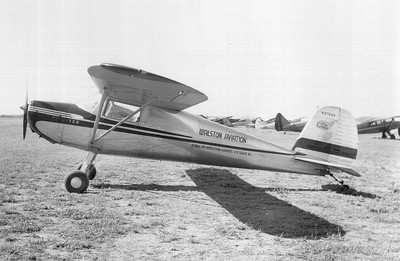Aero-Tips!
A good pilot is always learning -- how many times have you heard
this old standard throughout your flying career? There is no truer
statement in all of flying (well, with the possible exception of
"there are no old, bold pilots.") It's part of what makes aviation
so exciting for all of us... just when you think you've seen it
all, along comes a scenario you've never imagined.

Aero-News has called upon the expertise of Thomas P. Turner,
master CFI and all-around-good-guy, to bring our readers -- and us
-- daily tips to improve our skills as aviators, and as
representatives of the flying community. Some of them, you may have
heard before... but for each of us, there will also be something we
might never have considered before, or something that didn't
"stick" the way it should have the first time we memorized it for
the practical test.
It is our unabashed goal that "Aero-Tips" will help our readers
become better, safer pilots -- as well as introducing our
ground-bound readers to the concepts and principles that keep those
strange aluminum-and-composite contraptions in the air... and allow
them to soar magnificently through it.
Look for our daily Aero-Tips segments, coming each day to you
through the Aero-News Network. Suggestions for future Aero-Tips are
always welcome, as are additions or discussion of each day's tips.
Remember... when it comes to being good pilots, we're all in this
together.
Aero-Tips 03.03.06
In 1985 I bought a tail-dragging 1946 Cessna 120. I had a lot of
fun, and learned a lot about flying, for seven years in that
machine. According to the FAA registry it’s still providing
smiles and exercising feet in a flying club in Oklahoma.

The 120 was mechanically sound (despite some cosmetic
challenges). Family and friends, however, wondered aloud about the
wisdom of buying a then-39-years-old airplane. Their visions of
early-postwar cars and late 1940s houses rightly raised questions
of safety. Aviation magazines of the day (and I) responded by
correctly saying “older airplanes are safe because they are
inspected and maintained to a higher standard.”
More important than calendar time are aircraft use and cycles.
(NOTES: a “cycle” for an unpressurized airplane is one
takeoff through one landing). Airplanes certified before the
mid-1970s were not required to be tested for safe fatigue life...
so there are no data on how long they’ll last under various
uses or beyond a certain number of cycles.
I bought my plane in an era when most buyers shied away from
airplanes with more than 3000 total hours (my C120 had about 5000).
The oldest Cessna 172 in the world was under 30 years, the first
Cherokee around 20 years old. We thought these airplanes would last
almost forever.
Pay the Piper
And they might, if we take proper care of them. The industry,
owners groups and FAA’s Best Practices Guide for
Maintaining Aging General Aviation Airplanes calls for
voluntary inspections and maintenance procedures for continued
airworthiness as we explore the unknown aircraft use and cycles
spectrum. It’s time to pay the piper (and the Cessna, and the
Beech...) to properly care for a fleet whose average age is now
more than 30 years. There’s a lot we can do to keep planes
flying safely as they continue to age—but it’ll take
extra effort (and unfortunately expense) by owners to
“inspect and maintain airplanes to a higher
standard.”
Would I buy the C120 again today, now that it’s 60 years
old? With a good prepurchase inspection and ample maintenance
budget -- you bet!
Aero-Tip of the day: Be willing to voluntarily
spend time and money to keep aging airplanes safe—before the
expense of delayed maintenance or over-reaching Federal regulation
makes it too costly.
 ANN's Daily Aero-Term (04.26.24): DETRESFA (Distress Phrase)
ANN's Daily Aero-Term (04.26.24): DETRESFA (Distress Phrase) Aero-News: Quote of the Day (04.26.24)
Aero-News: Quote of the Day (04.26.24) ANN's Daily Aero-Term (04.27.24): Direct
ANN's Daily Aero-Term (04.27.24): Direct ANN's Daily Aero-Linx (04.27.24)
ANN's Daily Aero-Linx (04.27.24) Aero-News: Quote of the Day (04.27.24)
Aero-News: Quote of the Day (04.27.24)




